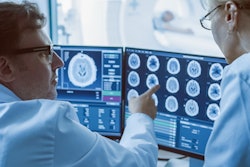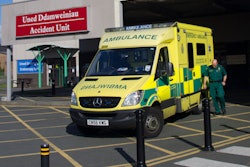
Full details have emerged in a report issued on 7 November about how an overworked radiologist missed a cancerous lesion and how the healthcare provider in New Zealand failed to respond adequately to concerns about workload pressures.
At Hawke's Bay Hospital on 4 November 2016, a woman in her 60s underwent an abdominal CT scan that included images of her lung bases. The scan revealed a nodule that was highly likely to be cancer, but the radiologist failed to detect it and further investigation was not undertaken, according to a report published by Deputy Health and Disability Commissioner Dr. Vanessa Caldwell.
The lesion was not "convincingly perceptible" in x-ray images taken in 2016, 2017, and 2018, but was identified in a CT scan of the abdomen and pelvis in February 2020, and subsequently, the woman was diagnosed with lung cancer, Caldwell added.
 Deputy Commissioner Dr. Vanessa Caldwell. Courtesy of the Health and Disability Commissioner.
Deputy Commissioner Dr. Vanessa Caldwell. Courtesy of the Health and Disability Commissioner.The consensus view was that the lesion at the base of the woman's right lung was visible on the original CT scan and should have been reported, noted Caldwell, who is a Doctor of Health Science and a trained psychologist who holds a master's in business administration. Caldwell stated that the radiologist failed to provide services "with reasonable care and skill," but the radiologist's failure also indicated "broader systems and organisational issues" at the Hawke's Bay District Health Board (now called Te Whatu Ora Te Matau a Māui Hawke's Bay).
The response from the district health board (DHB) to increasing radiology workloads had been insufficient to maintain standards, and Caldwell recommended that the DHB and the radiologist both provide a written apology to the patient and her family. Caldwell also recommended that the radiologist familiarize himself with the various radiological manifestations of lung cancer and that the DHB undertake an audit of randomly selected abdominal CT scans to confirm an improvement in reporting.
The radiologist's evidence
The radiologist, who has since resigned and now works overseas, told the investigation that he had been very upset to learn about his mistake.
"My role as a doctor is always to protect my patients and help them in any way possible, and I regret that I missed opportunities to do so in this case," the radiologist said, adding that there had been chronic understaffing in the radiology department, particularly in 2016 and 2017, which had "put tremendous pressure" on his daily work.
The heavy workload led to shorter reading and reporting times and the practice of double reading scans to reduce the risk of errors was "virtually unattainable." He also said that staff had raised concerns and requested additional resources from the DHB, but no action had been taken.
The radiologist also commented that the work environment at the DHB at the time required CT virtual colonoscopy (or colonography) exams to be read in a small side reporting room in the main CT room, where the 3D assessment software workstation was available.
"There were distractions in this environment, and continuous focus could be broken," he said.
Expert witness
As part of the investigation, Caldwell sought an independent view from Dr. Helen Moore, a partner and consultant radiologist at the Auckland Radiology Group.
"Numerous studies have shown a significant rate of error in radiological reporting accuracy; such that unfortunately, both under reporting or misinterpreting imaging findings is relatively common, and can occur despite otherwise excellent accuracy and experience," Moore said.
She noted there was presently an ongoing risk of an increased rate of medical error in New Zealand due to understaffing and increased workload, and while the radiologist's failure to see the lesion was "a serious departure from accepted practice," it was "a fairly possible error if working in an excessively busy distracting environment."
"It is important to note that such an error, occurring in isolation, does not signal general incompetence of radiological performance," Moore said, who requested that "peer disapproval of the individual is reduced and 'system' disapproval is increased."



















